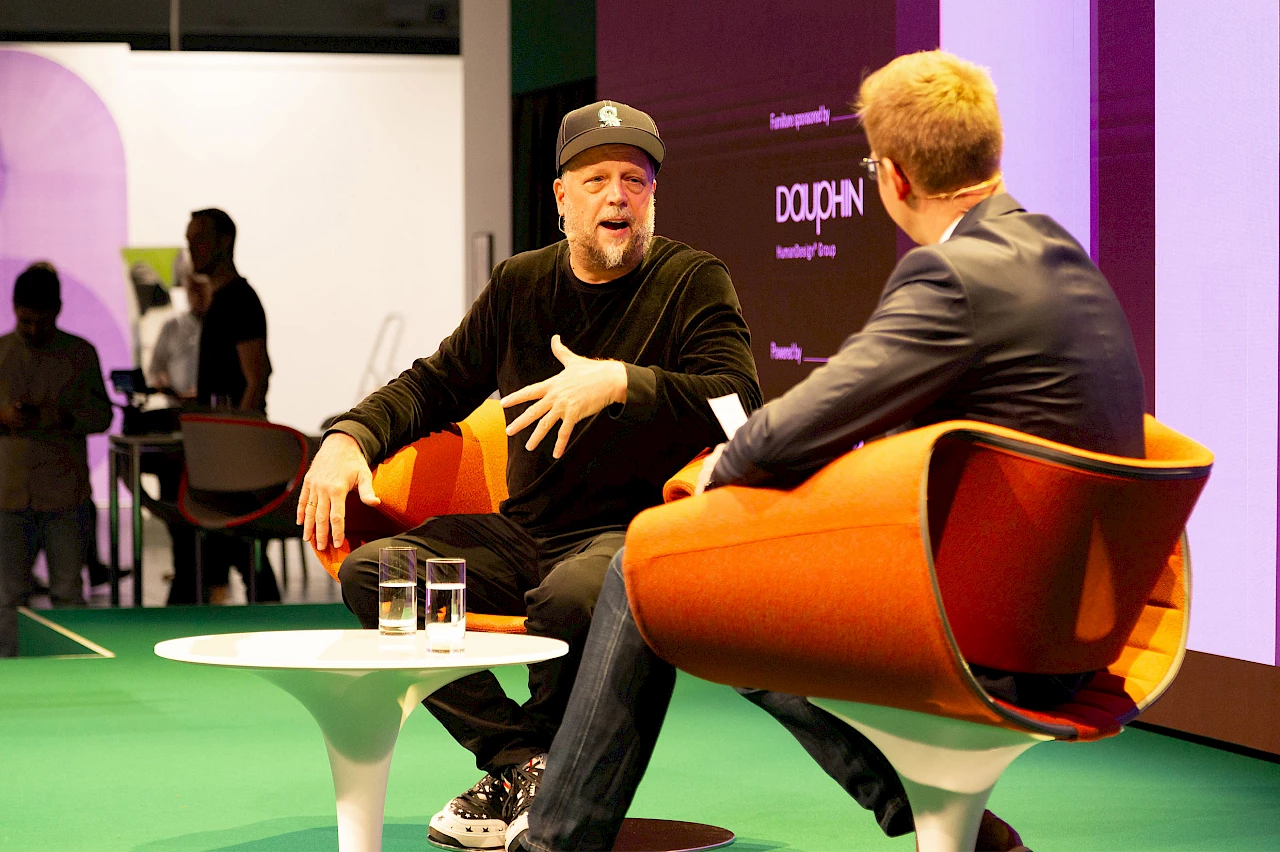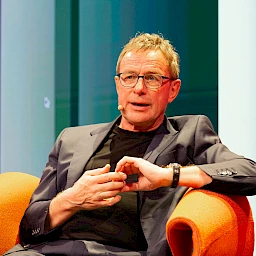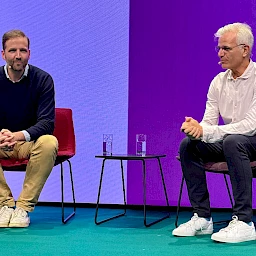Smudo from the German band Die Fantastischen Vier is not only a musician, but also a racing driver and technology enthusiast. At the Work Culture Festival, he spoke with Thorsten Giersch from DUP about two issues of our time: sustainability in racing and the impact of artificial intelligence (AI) on the world of music. An interpretation of what this could mean for the world of work.
Sustainability in motor sport: A contradiction or an opportunity?
Combining speed and sustainability may seem contradictory at first glance. But Smudo showed at ORGATEC that this apparent contradiction holds opportunities — not only for motor sport but also for other sectors, where it can serve as a role model. He and his racing team have been using alternative fuels such as biodiesel made from waste materials for 20 years. Today, the team uses Porsche GT3s equipped with sustainable components and proves that even an emissions-intensive sector can advance technological progress. For Smudo, motor sport is more than just a hobby — he sees it as a platform for testing innovative technologies and proving their suitability for everyday use. “Motor sport can play a pioneering role here and build a bridge,” he says. His approach also has parallels to the world of work — companies are faced with the task of reconciling economic goals with environmental responsibility. As in motor sport, incentives such as sustainability points can increase the pressure to innovate and promote sustainable processes. This is not just about visible sources of emissions, but about the entire life cycle — from the use of materials to the energy consumption of the infrastructure. For Smudo, partnership-based cooperation and openness to new technologies are the key. Sustainability must be viewed holistically in order to have a long-term impact, from the office building to the supply chain, so to speak. Whether on the race track or in businesses, sustainability becomes the force behind developments in technology and organisation.
AI in music: a helper with creative limitations
Another topic of the Work Culture Festival Talk was the role of AI in the music industry, which Smudo is ambivalent about. On the one hand, AI offers practical support, for example when removing background noise, optimising a mix or filtering out individual instruments. Such “little helpers”, as he calls them, make manual tasks easier and create space for creative processes. On the other hand, he emphasises that AI has clear limits when it comes to creativity. “I don’t believe that AI will deliver the brilliant ideas of tomorrow,” he says. The essence of creativity — the combination of emotion, context and intuition — remains a purely human ability. For Smudo, AI in its current form is not so much intelligent, but rather a reflection of what humans have already created. It recognises patterns and derives results from them without developing its own creative cosmos. Similar to music, he also sees potential in the automation of routine tasks in the world of work, but warns against becoming too dependent on such technologies. This can lead to an “inflated flatness” that endangers diversity and depth. Smudo therefore advocates an open and responsible approach to AI. Progress and innovation are valuable, but the focus on human creativity and emotional values must not be lost. Whether in music or in the world of work, the balance between technological possibilities and authenticity will be crucial.
Transformation: Culture as a success factor
If you want to get through the transformation, you need orientation and connection. In times of change, music offers more than just entertainment — it becomes a unifying element and creates community. Just as Die Fantastischen Vier have accompanied their fans through various phases of life for over 35 years, they create identification opportunities for people from various generations. But what is the secret of the band’s success? A key factor that has enabled Die Fantastischen Vier to last for 35 years is their special form of collaboration. Decisions are made in plenary sessions in which all band members and the management work together on an equal footing. Even in the event of differences of opinion, decisions are made jointly and everyone sticks together. “Once we’ve agreed on something, we go through with it,” explains Smudo. He calls the band’s open culture of discussion, which has laid the foundation for its longevity, a “culture of debate”. Even if a member is sceptical, in the end they stand behind the decision made and work towards the common goal. Smudo compares the dynamics of the band to a long-term partnership: “I can tell whether something is going down well or not just by the way their eyes twitch.”
In a world that is constantly changing and often seems chaotic, people are looking for orientation and places that give them a sense of stability and community. For Smudo, a concert is not just entertainment, but a “feel-good product”, a moment in which people can come together, create memories and regain a bit of security in a chaotic world. Offices can also be such feel-good places: Places where community, creativity and orientation are experienced. Just as music connects people, a well-thought-out corporate culture can help employees feel valued and involved — whether through inspiring working environments, open communication or achieving goals together. As change is the only constant, the pursuit of connection remains a key success factor — in music, in the office and beyond.
Smudo is co-founder of the band Die Fantastischen Vier, is active in motor sport and is concerned with the future of the music industry. In 1999, Smudo acquired his DMSB (German Motor Sport Federation) licence in the International C category. Since 2000, the Fanta Vier frontman has been active in motor sport together with Thomas von Löwis of Menar (Tom von Löwis) and no longer just rocks the stages, but also the nation’s racetracks. Smudo’s racing team Four Motors focuses on sustainability. Together with partners from research and development, the team has developed various bioconcept cars with body parts, interiors and interior trim made from renewable raw materials every two to three years. This makes the racing team the first one in Germany to specialise in sustainability in motor sport.
Cover photo: © IBA






